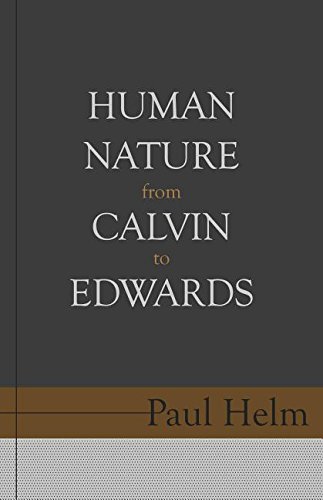A Book Review from Books At a Glance
By Ryan McGraw
What human beings are, and how human minds relate to human bodies, has been a long-standing question, both in theology and in philosophy. In modern times, it has even become a question as to whether or not there is such thing as human nature (xiii). Paul Helm’s purpose in this book is not to treat the effects of original righteousness or sin on human nature, but the character of human nature itself in classic Reformed theology. As is often the case, allowing a voice that has largely been muted in modern discussions of this issue to speak on its own terms can yield refreshing results. Helm helps us understand what Reformed authors taught on human nature, why they did so, and why their ideas were, and are, important. This makes his work indispensable for anyone interested in this topic, especially in relation to historical theology and the history of philosophy.
Helm did not intend to provide an exhaustive treatment of his topic, but to examine Reformed authors who were “typical” of the movement as a whole (xi). With appropriate scholarly modesty, he notes that any first attempt like this one at exploring human nature in Reformed thought will be incomplete and will allow for both revision and expansion. He begins with the influences of ancient philosophical viewpoints, as well as their patristic and medieval adaptations in the writings of John Calvin. He next adds Peter Martyr Vermigli, showing that the more scholastic Vermigli gravitated more towards Aristotle’s expressions while Calvin favored Platonic categories. His observations help us learn why most Reformed authors did not view the body as a “prison house of the soul” but rather as an integral component of the human person. The soul was the form of the body and was meant to live in union with the body even though body and soul remained distinct components of human beings. Chapters 3-7 treat a wide range of Reformed authors on human nature, focusing on questions such as the relation between body and soul, the faculties and powers of the soul, morality and agency, the self, and Reformed polemics related to such questions. Chapter 8 then introduces the complex philosophical influences of John Locke on views of human nature and particularly how these philosophical innovations affected Jonathan Edwards. The brief conclusion is an insightful summary of the ways in which Reformed authors adapted “conceptual distinctions” (239) from philosophy to suit the needs of understanding Scripture, as well as their critical use of scholastic categories to the same end (240).
The three appendices expand the author’s reach beyond his self-prescribed parameters by highlighting Herman Bavinck’s relatively scholastic faculty psychology, explain Locke’s critique of such views, and pressing more directly into some current views on the subject affecting our culture and modern pyschology. Helm makes an admirable start into this vital aspect of Reformed thought and has chosen his subjects with the kind of expert scholarly good sense that comes from decades of research in this field. His writing is clear and to the point, which makes this book an eminently useful starting point for everyone who wants to understand the intersection between theology and philosophy in relation to classic Reformed views of humanity.
This reviewer offers only one minor criticism that should by not means detract from his praise for Helm’s work. Scholars will wish that the author had consulted more primary source evidence rather than from translations of classic texts. Translations are invaluable to scholars and they make older works accessible to a broader audience, but scholarly research needs to use translations cautiously with an eye on original texts. Sometimes this makes a difference, such as when this reviewer puzzled over why, in English translation, Francis Turretin said that theology was not knowledge, while, in Latin, he said that theology was not scientia. “Knowledge” is a proper English translation of scientia, but the translation lost the fact that Turretin was arguing for the insufficiency of classifying theology as scientia as one of the standard Aristotelian philosophical habits. I am not implying that Helm misunderstands his subject or that his research is unsound, but a superb scholarly work of this kind needs more evidence that the research goes beyond translations, even though the author uses them well and, at times, compares them with original texts (especially it the case of Calvin).
Studying Reformed orthodoxy can be a tough endeavor. Doing so at a professional level demands at least working knowledge of multiple languages, understanding philosophical as well as theological trends, and the ability to identify the intersection between historical contexts and cultures with the development of ideas. This is particularly true in relation to the subject treated in this book. We can be thankful that people like Paul Helm have the skill for such studies and are willing to put in the effort to write books like this one. His treatment of human nature in Reformed thought ought to become a starting point, if not a gold standard, on this topic in the future.
Ryan M. McGraw
Greenville Presbyterian Theological Seminary
